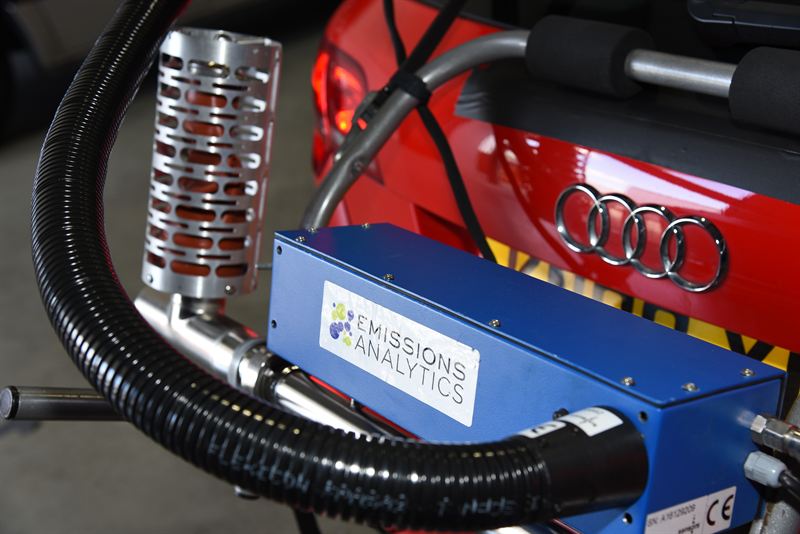New EQUA Index reveals true pollutant emissions for car buyers
EQUA Air Quality Index ratingsEQUA Air Quality Index ratings
Helping car buyers and providing the automotive industry with a level playing field, the new EQUA Air Quality Index rating scheme has been launched today to help clear the confusion over real-world NOx emissions.
With ratings openly published and freely available to all, including vehicle manufacturers and consumers, the EQUA Index is an ongoing programme, powered by Emissions Analytics, which provides an easy to understand sticker clearly showing each car’s performance.
The independently financed and implemented EQUA Index is designed to help end the confusion that many consumers face when trying to understand the complex subject of nitrogen oxides (NOx). It also supports the European automotive industry following high profile issues with Volkswagen diesels. With the first set of over 440 ratings available now from (http://www.equa.emissionsanalytics.com/), the programme will continuously add new vehicles to its database in order to form a compelling resource.
Developed by Emissions Analytics, the world’s leading independent provider of real-world emissions measurement, the EQUA Index allows manufacturers to demonstrate their vehicles’ clean credentials, and provide data to policymakers on progress in the drive to improve air quality.

Above: An EQUA Air Quality Index sticker
Nick Molden, CEO and founder of Emissions Analytics, said: “There’s a great deal of confusion among car buyers on the subject of pollutant emissions, but we’re able to deliver impartial and precise information to help them buy better. We’re also looking forward to working with the industry as a whole to highlight the best vehicles available.”
Recent headlines have highlighted the issue that real-world emissions can be four times or more higher than official NOx emissions figures. Designed to be clear and concise, the EQUA Air Quality Index allows manufacturers and retailers to show how different models compare in the showroom. It’s also ideal for car reviewers and publishers to include as new cars are reviewed.
Ensuring that the EQUA Index remains robust and relevant, an advisory board of leading academic and industry experts has been assembled. The board includes individuals from Imperial College London, King’s College London, the International Council on Clean Transportation and the University of Cambridge. Providing advice and guidance, as well as reviewing the test and rating methodology, the committee will provide input into the wider development of the programme.
Helen ApSimon, Air Pollution Studies, Imperial College London, one of the board members, said: “I am so glad to see this information on vehicle emissions made available so that the public can use it to avoid buying cars that are more harmful to human health.”
She was joined by Adam Boies, Department of Engineering, the University of Cambridge: “The EQUA Index provides important validation of real world emissions from commercially-available vehicles, which will enable us to track the industry’s effort to make meaningful reductions in noxious emissions.”
On the launch of the programme, Steve Gooding, director of the RAC Foundation, said: “This work is a welcome attempt to decipher a very complex set of air quality regulations and test results, and present them to motorists wanting to buy a clean car. It should also be required reading for manufacturers as it demonstrates that diesel cars can score well in real-world driving conditions. However, the star performers in the diesel category are few in number and these figures send out a strong message to several auto makers that they need to up their game.”
Intended to complement the forthcoming Real Driving Emissions regulations for new vehicle certification, the EQUA Air Quality Index will help monitor vehicle performance when driven normally on roads, and the effectiveness of the new regulations. This will prove vital when developing government policy to deliver improvements in urban air quality.

Notes to Editors
Nick Molden, CEO and founder of Emissions Analytics, is available for interview and comment on the issues relating to real-world fuel economy data and vehicle emissions.
Notes to Editors
About the EQUA Air Quality Index
The EQUA Air Quality Index for the European Union is designed to evaluate the performance of individual passenger cars in terms of tailpipe nitrogen oxide (NOx) emissions under real-world driving conditions. The scheme will assess cars using objective performance criteria, recognising the best performers in emission levels through the ratings awarded.
The ongoing programme will be separate from, and independent of, vehicle manufacturers’ certification tests. The results will be publicly available, with the aim of influencing policy development and implementation, allowing consumers to make informed purchase decisions and demonstrating the improvements that vehicle manufacturers are making to bring about improvements in air quality.
A technical reference document on the methodology is available on request.
The EQUA Index is owned, funded and operated by Emissions Analytics, which retains all rights associated with the results and ratings.
About Emissions Analytics
Emissions Analytics is a specialist in real-world, on-road vehicle emissions measurement and analysis, covering the European Union and the United States.
Its capabilities cover the measurement of regulated pollutants, including CO, CO2, NO, NO2, NOx, total hydrocarbons and particulate matter, using officially certified Portable Emissions Measurement Systems (PEMS).
Operating since 2011, it has carried out PEMS tests on more than 1000 model variants of passenger car in addition to testing heavy goods vehicles, tractors, taxis, vans and buses. It is the unrivalled expert in the field of on-road emissions monitoring.
Its bespoke services include benchmark tests, product evaluation and real-world running costs and it offers subscription access to its database of test results, as well as confidential testing services for product development and evaluation.
As experts in vehicle emissions and fuel consumption, Emissions Analytics supports a range of commercial and publicly funded organisations. It is currently in partnership with Imperial College, London, studying urban emissions for transport planning and policy.
Emissions Analytics is willing to provide journalists with sample data for specific vehicles upon request.
For more information, please contact:
Alex Michaelides (Torque): 020 7952 1078, amichaelides@torqueagencygroup.com






